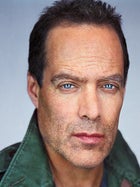Sebastian Junger has made a career out of winging it. In 1993, while trying to find someone to publish his eventual bestseller The Perfect Storm, he flew to Bosnia, where, with no experience and no credentials, he figured he'd make a go as a war reporter. Seven years later, having spent time in battle zones across the globe, he was in need of a refuge—a place where he could unwind back home. So he and fellow writer Scott Anderson decided to open their own bar, the Half King, on Manhattan's West Side. For his latest book, War, Junger embedded with a platoon of American soldiers in Afghanistan for a total of five months, including several stints alongside photographer and cameraman Tim Hetherington. The two decided to shoot and self-finance a documentary film—a first for both of them. The result, Restrepo, which airs this November on the National Geographic Channel, won the Grand Jury Prize for documentaries at Sundance, in January. All of which is to say that Junger, now 48, is writing his own story. Here, ���ϳԹ���'s ERIC HANSEN downloads some of the high points.
Video Interview
Watch a series of conversations with Sebastian Junger at .Sebastian Junger
 Sebastian Junger
Sebastian JungerTHE THINGS IN LIFE that aren't exciting, if they're a hassle, I just don't do 'em. Like, I could go out and buy a shaving mirror, or I could use the back of a CD.
I'VE WRITTEN THINGS down while running. It doesn't work very well. In Liberia, in 2003, we were getting mortared pretty badly. There was a lot of movement on the street, and I was alternating between dropping to the ground and sprinting, while trying to write notes at the same time. In situations like that, you can't take notes. If you try, you can't read 'em afterwards. And anyway, you just look like a jackass. A video camera solves all those problems.
I WANT THE whole country to see Restrepo. And I don't want them to watch it simply as a documentary. I want them to watch it because we're at war. And whether you're for or against the war, this is what that war looks like up close. We all need to know what that looks and sounds and feels like.
I REMEMBER BRIEFLY thinking that I wanted to be a lawyer, because Abraham Lincoln was a lawyer. But my mother explained that lawyers back then were different from lawyers now.
IN COLLEGE, I was a really good distance runner. I ran a 4:12 mile, 2:21 marathons. And I'd heard that the Navajo were excellent distance runners and had a long, pre-Columbian tradition of it. So when I was 19 or 20, I moved out on the reservation for a summer and trained with their best guys. I was the first white guy they'd met who could beat most of their top runners. I ended up writing my thesis on Navajo long-distance running and its traditional roots—and I loved it. I was on fire. The thesis seemed to be pretty close to what I imagined journalism to be. That was a naive thought.
FOR YEARS, I floundered around in Boston, trying to place articles in magazines. By the time I realized it wasn't working, it was too late to back up and try something else. I was 30 or 31. So I just gave up and went to Bosnia. I thought I would try to be a war reporter. I had no idea what that meant or how to do it.
THE PERFECT STORM wasn't me; it was the exception. I stepped out of my life to write that book, and then stepped back into my life, and most people don't realize that.
EVERYTHING I DO, I just assume I'm going to fail. It all seems impossible. But I'm very scared of failure—you know, everyone is—and that sense of impossibility gets me to crank up the turbines. Everything mentally and physically at my disposal I pour into a project.
IF I WRITE GARBAGE, I know it's garbage. You have to work hard. “The rain pounded down”—fine… Good writing is good rhythm. Period. End of sentence.
IN HEMINGWAY'S DAY, there were a lot of macho reporters who were also real literary craftsmen. Hemingway. Martha Gellhorn. Remarque in WWI. George Orwell sent himself over to Spain and almost got killed. That's not happening anymore. The Iowa Writers' Workshop is not turning out guys who are going to Liberia. They stay in the U.S. and write short stories, which is cool, you know, but doesn't interest me.
I SLEPT ON THE FLOOR until I was 40. I had a futon mattress in the corner of the room. And it never even occurred to me that that was a weird thing to do, until I had a girlfriend who sort of put her foot down. I stayed in my same tiny apartment on the Lower East Side, mostly because I just didn't want to move.
I KNEW I WAS GOING to be out there for a long time reporting the book. I thought, I might as well shoot a lot of video and see if I can turn it into a documentary. The sacrifices only started when we decided to self-finance the project, which dug deep into our bank accounts. We both put in everything we had. And it was during a recession that we were making a documentary about a war. The last time my accountant was that upset with me was when I started the bar.
BECAUSE I'M NOT A SOLDIER, I'm not wrestling with the moral issues around killing. I'm not having best friends killed. You know, I'm 48. My identity is pretty solid. I have everything going for me in terms of dealing with it psychologically—and they don't. There are some lingering effects after every assignment I do anywhere, if it's violent, but nothing long-term or problematic.
EVERY TRIP I GO ON, I'm riddled with anxiety and paranoia. Overconfidence is not a problem.
MY WIFE KNOWS I'm not a cowboy. I'm not taking risks for the sake of taking risks. You can report on wars and not get shot at.
I WAITED TABLES for a while. I worked for tree companies as a “high climber,” which means taking trees down from the top. It was an awesome job.
WHEN I WAS A KID, driving around northern Mexico in the mid-eighties—that was probably the scariest thing I've ever done. We'd go into a bar to get a drink and there'd be guys in there with pistols in their back pockets. It was, like, completely lawless.
I RUN, play a lot of chess with my friends, read a lot. I like building shit.
I DON'T FEEL TOO OLD. I was in Peru once with my wife. We were walking the Inca Trail to Machu Picchu, and we were walking over passes at almost 14,000 feet, totally unacclimated, way harder than what I did with the soldiers—the altitude was just killing us. We had our personal stuff, but the porters carried the communal gear. And the lead porter, probably the fittest and happiest guy out there, was 66. I realized that probably up until age 70, to some degree, aging is elective. It's socially determined when you start to feel old.
The HALF KING is doing fine. It's cranking. We employ something like 40 people now. It's an important part of the neighborhood and an important part of our lives.
THE PEOPLE I KNOW personally who cannot sit down and chill out for a while are people who have not really come to terms with their emotional, inner story. They're staying a step ahead of it. I did that through my twenties and thirties. In my forties, I stopped working so hard for a bit and confronted a certain amount of stuff about myself. I think that one of the impetuses for working outrageously hard and traveling constantly and always being on deadline is that your personality can't catch up with you.
I HONESTLY haven't even thought about it, what's next. It won't be war. Something different. But I really don't know. I'm incapable of thinking very far ahead. My horizon is like six months. Maximum. In terms of my life choices, I just don't think outside of six months.


